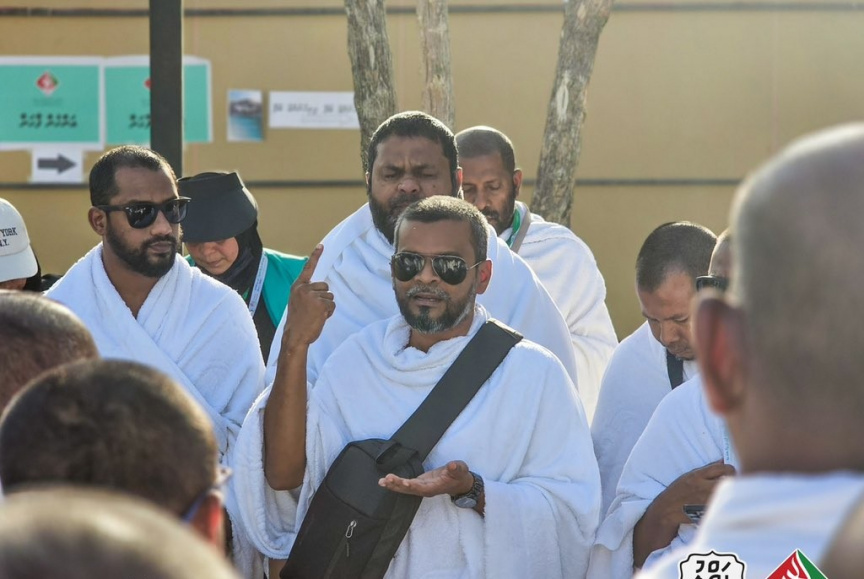
Maldives Hajj Corporation’s managing director Mohamed Shakeel in Saudi Arabia with hajj pilgrims on June 5, 2025. (Photo/Maldives Hajj Corporation)
Maldives Hajj Corporation said on Thursday that its hotel development venture in K. Maafushi will not be financed with the fees it collects from pilgrims, but is based on the contractor financing model.
Hajj Corporation had announced plans to launch halal tourism in local tourism hotspot Maafushi back in November 2024. Back then, Hajj Corporation’s managing director Mohamed Shakeel said it was part of efforts by the corporation to invest in low-risk business ventures in order to lower the cost of hajj pilgrimages.
But Finance Minister Moosa Zameer initially voiced opposition to the plan. At a Parliament sitting in December 2024, Zameer said he does not believe that the Hajj Corporation venturing into the hotel or guesthouse business can produce a “good outcome.” He advised the corporation to reconsider the plan.
The initiative also received criticism from the public, with many accusing the Hajj Corporation of attempting to profit off the hard-earned money paid by people to embark on the holy hajj pilgrimage.
But on Wednesday, the Hajj Corporation posted an announcement seeking a contractor to build the hotel.
Responding to the criticism, Shakeel told Sun on Thursday that that the hotel business isn’t prohibited by the Finance Ministry.
He also said that the corporation decided to run the project in order to ease the financial burden on the state to cover the corporation’s costs, and boost its own financial autonomy.
Shakeel stressed that the corporation is not investing in the hotel project with money it collects from pilgrims. He said that the Hajj Corporation has created a new company, the Maafushi Islamic Tourism Pvt. Ltd. (MIT), which will be running the project based on the contractor financing model.
“The company will use employees from Hajj Corporation to manage its affairs. No new employees will be hired. We are not, under any circumstances, running a business with the money paid by hajj pilgrims. This is a contractor financing project,” he said.

Shakeel said that the corporation is already having an office complex built in Hulhumale’ under the same mode. He described it as an important project, which will eliminate the need for the Hajj Corporation to pay rent, and will also ensure the corporation is able to generate revenue from renting out office space from the building once it finishes paying the contractor with the rent money.
Shakeel said that the price of the corporation’s hajj package – MVR 69,965 – was set back in 2013 and does not reflect in the rise in prices of airline tickets, accommodation and food since then.
“Think about it, are we able to get anything done for the prices of 13 years ago? No, right? While we charge MVR 69,965 per pilgrim, the fact of the matter is that we now spend over MVR 100,000 per head for pilgrimages. The price of transport, hotels and food are all significantly higher compared to 13 years back,” he said.
Shakeel said it costs around MVR 40 million annually for hajj pilgrimages – an amount that he said isn’t covered from fees taken by pilgrims.
He said that this means the state has to spend millions each year to cover the shortfall.
“We are entering this [hotel] business to get foreign currency. Think about how that MVR 40 million can be utilized for something else the people need if we are able to cover the cost with the revenue we generate from that business,” he said.
Shakeel added that this is not a new concept, but one that is practiced elsewhere, including in Malaysia, which has Tabung Haji (TH). TH facilitates savings for the pilgrimage to Mecca through investment in Shariah-compliant vehicles. And through its subsidiaries, the company also engaged in other industries such as finance, hospitality, property, plantation and information technology.
Maafushi, where Hajj Corporation plans to build its hotel, is a bustling island close to the capital that is famous as a local tourism hotspot.